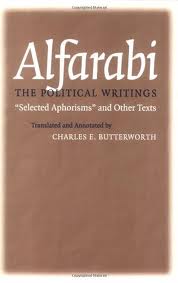Alfarabi. The Political Writings. Translated by Charles Butterworth. Ithaca, NY: Cornell University Press, 2001.
Excerpt:
1. Religion is opinions and actions, determined and restricted with stipulations and prescribed for a community by their first ruler, who seeks to obtain through their practicing it a specific purpose with respect to them or by means of them.
The community may be a tribe, a city or district, a great nation, or many nations.
If the first ruler is virtuous and his rulership truly virtuous, then in what he prescribes he seeks only to obtain, for himself and for everyone under his rulership, the ultimate happiness that is truly happiness; and that religion will be virtuous religion. If his rulership is ignorant, then in what he prescribes he seeks only to obtain, for himself by means of them, one of the ignorant goods – either necessary good, that is, health and bodily well being; or wealth; or honor and glory; or conquest – to win that good, be happy with it to the exclusion of them, and make those under his rulership tools he uses to arrive at his purpose and to retain them in his possession. Or he seeks to obtain this good for them to the exclusion of himself, or both for himself and them; these two are the most virtuous of the ignorant rulers. …
… Now the craft of the virtuous first ruler is kingly and joined with revelation from God. Indeed, he determines the actions and opinions in the virtuous religion by means of revelation. This occurs in one or both of two ways: one is that they are all revealed to him as determined; the second is that he determines them by means of the faculty he acquires from revelation and from the Revealer, may He be exalted, so that the stipulations with which he determines the virtuous opinions and actions are disclosed to him by means of it.
Online:
Cornell University Press
Amazon
